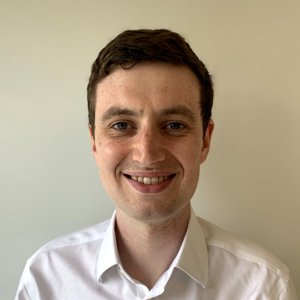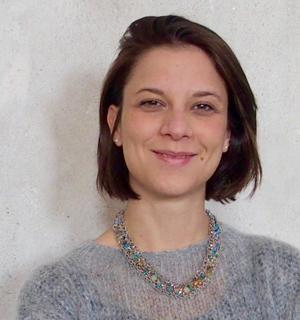The Angharad Dodds John Fellowship
The Angharad Dodds John Fellowship in Mental Health and Neuropsychiatry
The Angharad Dodds John Fund was generously established in 2012 by Robert John 1968 and Philippa Dodds John. The initial endowed funds support a Fellowship in Mental Health and Neuropsychiatry and, since 2016, subsequent gifts have supported annual bursaries to graduate students in the same discipline.
The Angharad Dodds John Fellowship and Studentships
“We are delighted to be able to advance the work of Professor Trevor Robbins and Professor Zoe Kourtzi and their team, through support to the Angharad Dodds John Fellowship and Bursaries in Mental Health and Neuropsychiatry. Angharad was the second of our five children who, sadly, had a short life dying in 1980 some 6 months before her third birthday.
Although born with many challenges, she was a Downs baby with significant heart and digestion problems, she contributed significantly to our family and to us. It is fitting therefore that she, albeit indirectly, can make her contribution to the future as her four brothers are able to do through their own endeavours.”
Robert and Philippa John

The Angharad Dodds John Fellowship
Professor Trevor Robbins, whose research focuses on psychopharmacology, was the first Angharad Dodds John Fellow. His particular interest lies in the cognitive functions of the frontal lobes of the brain, in understanding the neural basis of motivation and reward, in the neuropsychological basis of drug addiction and obsessive-compulsive disorder, and in the treatment of neurocognitive disorders such as Alzheimer’s and Parkinson’s diseases, schizophrenia and attention deficit disorder with ‘cognitive enhancing’ drugs. Professor Robbins is now an Emeritus Fellow though his research continues as University Professor of Cognitive Neuroscience.
Professor Zoe Kourtzi now holds the Angharad Dodds John Fellowship. Professor Kourtzi is a cognitive neuroscientist, specialising in lifelong learning and brain plasticity. Her work aims to understand the role of learning and experience in enabling humans of all ages to translate sensory experience into complex decisions and adaptive behaviours. She is University Professor of Experimental Psychology and a Fellow of and Cambridge lead for the Alan Turing Institute.
The Angharad Dodds John Bursaries in Mental Health and Neuropsychiatry.
The Angharad Dodds John Bursaries support a fourth year of research by graduate students at a critical juncture in their research but when typically PhD funding runs out. The Bursaries allow candidates to make significant strides in their work by seeking publication of papers in high profile journals; completing additional experiments; publicising findings and securing the crucial first research fellowship.
Beneficiaries of the Angharad Dodds John Bursaries
2016-17 Matilde Vaghi
2017-18 Benjamin Philips
2018-19 Joost Haarsma
2019-20 Jonathan Kanen
2020-21 Lisa Duan
Dr Lisa Duan 2020-2021

Lisa completed her PhD at the Department of Psychology and at the Behavioural and Clinical Neuroscience Institute, supervised by Professor Trevor Robbins and is now pursuing a career at the World Health Organisation in Manila. The Bursary helped her to publish a journal article to the prestigious journal Neuron based on her PhD work.
“I am very grateful to have received the generous support from the Angharad Dodds John Bursary in Mental Health and Neuropsychiatry, to further my research on the underlying neurobiological mechanisms of Obsessive-Compulsive Disorder (OCD). I am planning to utilize the experience gained during my PhD to further my career in Mental Health and Life Sciences.”
Dr Jonathan Kanen 2019-2020

Jonathan Kanen completed his PhD in 2020, supported by a Gates Cambridge Scholarship, under the supervision of Professor Trevor Robbins. Jonathan holds a bachelor’s degree in psychology from Vassar College in Poughkeepsie, New York, after which he worked as a junior research scientist in the laboratory of Professor Elizabeth Phelps at New York University.
“I am very grateful for the support of the Angharad Dodds John Bursary in Mental Health and Neuropsychiatry.
Following the bursary period, in summer 2021 I will complete the final two years of my MD degree at Cooper Medical School of Rowan University in Camden, New Jersey, my home state. I then plan to pursue specialisation in psychiatry via a residency programme in the United States.”
Over the course of his career, Jonathan hopes to facilitate communication and collaboration between the basic neuroscience and clinical communities with the ultimate aim of improving the lives of individuals suffering from mental illness.
Joost Haarsma 2018-2019

“The one-year fellowship that I was able to pursue thanks to the Angharad Dodds John Bursary allowed me to advance my skills in laminar neuroimaging. After the Fellowship I worked in Oxford in the lab of Dr Michael Browning as a post-doctoral researcher for 6 months. There I studied the role of the cholinergic system in how the brain learns from positive and negative feedback in changing environments, which is of relevance to understanding mood disorders.
In May 2020 I joined the lab of Dr Peter Kok at UCL where I study how expectations shape perception both in healthy individuals as well as individuals with perceptual abnormalities. The bursary has been of vital importance in joining this lab, as it allowed me to build up experience in laminar neuroimaging, making me more competitive for the position.''
Ben Phillips 2011-2018

“I was very fortunate to be supported by the Angharad Dodds John Bursary following the conclusion of my PhD studies in Behavioural Neuroscience at Downing College. I worked on 2 main projects during the Bursary. The first was an industrial-academic collaboration focussed on evaluating the potential of a novel antidepressant compound. The second involved the application of reinforcement learning modelling to a range of behavioural pharmacology datasets across multiple species.
I am extremely grateful for the Bursary, as it enabled me to build on the work I completed during my PhD whilst expanding my skills in data modelling, statistical programming and effective scientific collaboration. I still have plans to finalise and publish a number of further manuscripts.”
After the conclusion of the Bursary period, Ben spent 2 years as a postdoctoral research associate at the Neuronal Oscillations Lab at the department of Physiology, Development and Neuroscience, University of Cambridge. His work during this time utilised a range of neural monitoring and interventional techniques, including optogenetics, electrophysiological recording and calcium imaging, to investigate dopamine-dependent neural dynamics in the hippocampus. He has recently joined AstraZeneca as a Senior Statistician in the Quantitative Biology department.
Matilde M. Vaghi 2016-2017

Matilde gained her PhD at the University of Cambridge in 2016 under the supervision of Trevor Robbins, focusing on the cognitive and neural underpinnings of Obsessive Compulsive Disorder (OCD).
“While being supported by the Angharad Dodds John Bursary in Mental Health and Neuropsychiatry I found that confidence and action can become uncoupled in OCD, whereby patients seem to purse actions even when they believe it is not necessary to do so. This insight informed our understanding of OCD by suggesting that, contrary to what prevailing theories suggest, compulsive behaviours (i.e. actions excessively repeated) do not stem from inaccurate beliefs. This work has been eminently published as listed below.
I would like to express deep gratitude to the Dodds John family, whose generosity supports research aimed at reaching a better understanding of debilitating neuropsychiatric disorders.”
Following her bursary period Mathilde moved to the Max Planck UCL Centre for Computational Psychiatry and Ageing Research. Here, Matilde worked on computational approaches to understand psychiatry with Professors Robb Rutledge and Ray Dolan, before being awarded a Human Frontier Science Program Fellowship and a NARSAD Young Investigator Grant to pursue her post-doctoral career at Stanford University with Professor Russ Poldrack.
